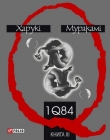
Текст книги "1q84"
Автор книги: Haruki Murakami
Жанр:
Современная проза
сообщить о нарушении
Текущая страница: 64 (всего у книги 81 страниц)
He stripped to his underwear and snuggled into the sleeping bag. The cold made him tremble slightly. At night the empty apartment was unexpectedly chilly. He thought he might need a small electric space heater.
As he lay shivering, alone in the sleeping bag, he recalled the days when he had been surrounded by his family. He didn’t particularly miss those days. His life now was so completely different that these memories merely popped up to illustrate that fact. Even when he was living with his family, Ushikawa had felt lonely. He never opened up to anyone and thought that his ordinary life would never last. Deep down he was convinced that one day it would all too easily fall apart—his busy days as a lawyer, his generous income, his nice house in Chuorinkan, his not-bad-looking wife, his cute daughters, both attending private elementary school, his pedigreed dog. So when his life steadily fell apart bit by bit and he was left all alone, he was actually relieved. Thank God, he thought. Nothing to worry about now. I’m back right where I started.
Is this what it means to go back to square one?
He curled up like a maggot in the sleeping bag and stared at the dark ceiling. He had sat in the same position for too long and his joints ached. Shivering in the cold, making do with a cold bun for dinner, standing watch over the entrance of a cheap apartment that was ready to be torn down, watching the unattractive people coming in and out, peeing into a wash bucket. Is this what it means to go back to square one? he asked again. He remembered something he had forgotten to do. He crawled out of the sleeping bag, poured the urine in the bucket into the toilet, pushed the wobbly handle, and flushed it down. The sleeping bag had just started to warm up, and he had hesitated to get out. Just leave it, he had thought—but if he happened to slip in the dark he would regret it. Afterward he crawled back into the sleeping bag and shivered in the cold again.
Is this what it means to go back to square one?
Most likely. He had nothing left to lose, other than his life. It was all very clear-cut. In the darkness, a razor-thin smile came to Ushikawa’s lips.
CHAPTER 14
Aomame
THIS LITTLE ONE OF MINE
For the most part, Aomame’s life had become filled with confusion. She felt as though she were blindly groping around in the dark. Ordinary logic and reason didn’t function in this 1Q84 world, and she couldn’t predict what was going to happen to her next. She felt sure, though, that she would survive the next few months and give birth to the baby. This was nothing more than a hunch, though a strong one. Everything was proceeding on the premise that she would give birth to this child. She could just sense it.
She remembered the last words that Leader had spoken. “You are fated to pass through great hardships and trials,” he had said. “Once you have done that, you should be able to see things as they are supposed to be.”
He knew something. Something vital. And he had tried—in vague and ambiguous terms—to give me this message, Aomame thought. The hardship he spoke of may have been when I took myself to the brink of death, when I took the pistol to that spot in front of the Esso sign, meaning to kill myself. But I came back, without dying, and discovered I was pregnant. This, too, might have been preordained.
As they entered December, the winds grew fierce for a few days. The fallen zelkova leaves whipped against the plastic screen on the balcony with a dry, biting sound. The cold wind let out a warning as it whistled between the bare branches of the trees. The caws of the crows grew sharper, keener. Winter had arrived.
Every day, she became even more convinced that the baby growing in her womb was Tengo’s child, until this theory became an established fact. It wasn’t logical enough to convince a third party, but it made sense to her. It was obvious.
If I’m pregnant without having had sex, who could the man possibly be other than Tengo?
In November she had begun putting on weight. She couldn’t go outside, but she more than made up for it by continuing to work out and strictly watching her diet. After age twenty she never weighed more than 115 pounds. But one day the scale showed she weighed 119, and after that her weight never dropped below it. She felt like her face, too, had rounded out. No doubt this little one wanted its mother to plump up.
Together with this little one she continued to keep watch over the playground at night, hoping to spot the silhouette of a large young man sitting alone on the slide. As she gazed at the two moons, lined up side by side in the early-winter sky, Aomame rubbed her belly through the blanket. Occasionally tears would well up for no reason. She would find a tear rolling down her cheek and falling to the blanket on her lap. Maybe it was because she was lonely, or because she was anxious. Or maybe pregnancy had made her more sensitive. Or maybe it was merely the cold wind stimulating the tear ducts to produce tears. Whatever the reason, Aomame let the tears flow without wiping them away.
Once she had cried for a while, at a certain point the tears would stop, and she would continue her lonely vigil. No, she thought, I’m not that lonely. I have this little one with me. There are two of us—two of us looking up at the two moons, waiting for Tengo to appear. From time to time she would pick up her binoculars and focus on the deserted slide. Then she would pick up the automatic pistol to check its heft and what it felt like. Protecting myself, searching for Tengo, and providing this little one with nourishment. Those are my duties now.
One time, as the cold wind blew and she kept watch over the playground, Aomame realized she believed in God. It was a sudden discovery, like finding, with the soles of your feet, solid ground beneath the mud. It was a mysterious sensation, an unexpected awareness. Ever since she could remember, she had always hated this thing called God. More precisely, she rejected the people and the system that intervened between her and God. For years she had equated those people and that system with God. Hating them meant hating God.
Since the moment she was born they had been near her, controlling her, ordering her around, all in the name of God, driving her into a corner. In the name of God, they stole her time and her freedom, putting shackles on her heart. They preached about God’s kindness, but preached twice as much about his wrath and intolerance. At age eleven, Aomame made up her mind and was ultimately able to break free from that world. In doing so, though, much had been sacrificed.
If God didn’t exist, then how much brighter my life would be, how much richer. Aomame often thought this. Then she should be able to share all the beautiful memories that normal children had, without the constant anger and fear that tormented her. And then how much more positive, peaceful, and fulfilling her life might be.
Despite all this, as she sat there, her palm resting on her belly, peeking through the slats of the plastic boards at the deserted playground, she couldn’t help but come to the realization that she believed in God. When she had mechanically repeated the words of the prayer, when she brought her hands together, she had believed in a God outside the conscious realm. It was a feeling that had seeped into her marrow, something that could not be driven away by logic or emotion. Even hatred and anger couldn’t erase it.
But this isn’t their God, she decided. It’s my God. This is a God I have found through sacrificing my own life, through my flesh being cut, my skin ripped off, my blood sucked away, my nails torn, all my time and hopes and memories being stolen from me. This is not a God with a form. No white clothes, no long beard. This God has no doctrine, no scripture, no precepts. No reward, no punishment. This God doesn’t give, and doesn’t take away. There is no heaven up in the sky, no hell down below. When it’s hot, and when it’s cold, God is simply there.
From time to time, she would recall Leader’s final words before he died. She could never forget his rich baritone. Just like she could never forget the feeling of stabbing a needle into the back of his neck.
Where there is light, there must be shadow, where there is shadow, there must be light. There is no shadow without light and no light without shadow…. We do not know if the so-called Little People are good or evil. This is, in a sense, something that surpasses our understanding and our definitions. We have lived with them since long, long ago—from a time before good and evil even existed, when people’s minds were still benighted.
Are God and the Little People opposites? Or two sides of the same thing?
Aomame had no idea. What she did know was that she had to protect this little one inside her. And to do so it became necessary to somehow believe in God. Or to recognize the fact that she believed in God.
Aomame pondered the idea of God. God has no form, yet is able to take on any form. The image she had was of a streamlined Mercedes coupe, a brand-new car just delivered from the dealer. An elegant, middle-aged woman coming out of that car, in the middle of an expressway running through the city, offering her beautiful spring coat to the naked Aomame. To protect her from the chilly wind, and people’s rude stares. And then, without a word, getting back in her silver coupe. The woman knew—that Aomame had a baby within her. That Aomame had to be protected.
. . .
She began to have a new dream. In the dream she is imprisoned in a white room. A small, cube-shaped room, no windows, a single door. A plain bed, no frills, on which she lies sleeping, faceup. A light hanging over the bed illuminates her hugely swollen belly. It doesn’t look like her own body, but it is definitely a part of Aomame’s flesh. It is getting close to the time for the baby’s delivery.
The room is guarded by Buzzcut and Ponytail. The duo is dead set against making any more errors. They made a mistake once and they need to recover their reputation. Their assignment is to make sure that Aomame does not leave this room, and that no one enters. They wait for the birth of the little one. It seems they plan to snatch it away from Aomame the moment it is born.
Aomame calls out, desperately seeking help. But this room is built of special material. The walls, floor, and ceiling immediately absorb any sound. She can’t even hear her own scream. Aomame prays that the woman in the Mercedes coupe will come and rescue her—her and the little one. But her voice is sucked, in vain, into the walls of that white room.
The little one absorbs nourishment through its umbilical cord, and is growing larger by the minute. Hoping to break out of that lukewarm darkness, it kicks against the walls of her womb. Hoping for light, and freedom.
Tall Ponytail sits in a chair beside the door, hands in his lap, staring at a point in space. Perhaps a small, dense cloud is floating there. Buzzcut stands next to the bed. They wear the same dark suits as before. Buzzcut raises his arm from time to time to glance at his watch, like somebody waiting for an important train to pull into the station.
Aomame can’t move her arms and legs. It doesn’t feel like she is tied down, but still she can’t move. There is no feeling in her fingers. She has a premonition that her labor pains are about to begin. Like that fateful train drawing nearer to the station, exactly on schedule. She can hear the slight vibration of the rails as it gets closer.
And then she wakes up.
She took a shower to wash off the sweat and changed clothes. She tossed her sweaty clothes into the washer. There was no way she wanted to have this dream, but it came upon her anyway. The details sometimes changed, but the place and outcome were always the same: the cube-shaped white room, the approaching labor pains, the duo in their bland, dark suits.
The two men knew she was pregnant with the little one—or they were going to find out. Aomame was prepared. If need be, she would have no problem pumping all the 9mm bullets she had into Ponytail and Buzzcut. The God that protected her was also, at times, a bloody God.
. . .
A knock came at the door. Aomame sat down on a stool in the kitchen and gripped the automatic pistol tight, the safety off. Outside a cold rain had been falling since morning. The world was enveloped in the smell of winter rain.
The knocks stopped. “Hello, Miss Takai,” a man’s voice said on the other side of the door. “It’s me, your friendly NHK collector. Sorry to bother you again, but I’m back to collect the subscription fee. I know you’re there, Miss Takai.”
Aomame faced the door and silently spoke. We called NHK and asked about this. You’re nothing but someone posing as an NHK man. Who are you? And what do you want here?
“When people receive things, they have to pay for them. That’s the way the world works. You receive a TV signal, so you have to pay the fee. Receiving without paying isn’t fair. It’s the same as stealing.”
His voice echoed loudly in the hallway. A hoarse, but piercing voice.
“My personal feelings are not involved in this at all. I don’t hate you, and I’m not trying to punish you whatsoever. It’s just that I can’t stand when things are unfair. People have to pay for what they receive. Miss Takai, as long as you don’t open up, I’ll be back again and again to bang on your door. And I don’t think that’s what you want. I’m not some unreasonable old coot. If we talk, I’m sure we can come to an understanding. So would you be kind enough to open the door?”
The knocking continued.
Aomame gripped the pistol tighter. This man must know I’m having a baby. A thin sheen of sweat formed under her arms and on the tip of her nose. I am never going to open this door. He can try to use a duplicate key, or try to force it open, but if he does I’m going to empty this entire clip into his belly—NHK collector or not.
No, that probably wouldn’t happen. And she knew it. He couldn’t open the door. As long as she didn’t open it from the inside, the door was set up so it couldn’t be opened. Which is why the man got so irritated and voluble, using every verbal trick in the book trying to make her tense and on edge.
Ten minutes later, the man left. But only after he had, in a thunderous voice, threatened and ridiculed her, slyly tried to win her over to his side, denounced her in no uncertain terms, and finally announced he would be back to pay her another visit.
“You can’t escape, Miss Takai. As long as you get the TV signal I will be back. I’m not the kind of man who gives up so easily. That’s just my personality. Well, we will be seeing each other again very soon.”
She didn’t hear his footsteps, but he was no longer standing outside the door. Aomame peeked through the peephole to make sure. She set the safety on the pistol and washed her face in the sink. Her armpits were soaked. As she changed to a fresh shirt she stood, naked, in front of the mirror. Her stomach still wasn’t showing enough to notice, but she knew an important secret lay hidden within.
She spoke to the dowager on the phone. After Tamaru had gone over a few points with her, he handed the phone to the dowager without a word. They used a roundabout way of speaking, avoiding any clear-cut terms. At least at first.
“We have already secured a new place for you,” the dowager said. “There you can perform the task you’ve been planning on. It’s a safe place and you can get checked out regularly by a specialist. If you’re willing, you can move there as soon as you would like.”
Should she tell the dowager about the people who were after her little one? How in her dreams the guys from Sakigake were trying to get hold of her child? How the phony NHK collector using all his wiles to get her to open the door was probably after the same thing? But Aomame gave up the idea. She trusted the dowager, and respected her deeply. But that wasn’t the issue. Which world was she living in? For the time being, that was the point.
“How have you been feeling?” the dowager asked.
“Everything seems to be going well so far,” Aomame replied.
“I’m very glad to hear it,” the dowager said. “But your voice seems different somehow. Maybe I’m just imagining things, but you sound a little tense and guarded. If there’s anything that’s bothering you, anything at all, please don’t hesitate to tell us. We might be able to help you.”
“I think being in one place for so long has made me anxious, maybe, without my even realizing it. But I’m taking good care of myself. That’s my field, after all,” Aomame replied, careful with her tone of voice.
“Of course,” the dowager responded. She paused again. “A little while ago a suspicious man was hanging around our place for a couple of days. He seemed mainly interested in checking out the safe house. I asked the three women staying there to look at the pictures on our security cameras, but none of them recognized him. It might be somebody who’s after you.”
Aomame frowned slightly. “You mean they’ve figured out our connection?”
“I’m not sure about that. We’re at the point where we need to consider that possibility, though. This man looks quite unusual. He has a big, misshapen head. The top is flat, and he’s balding. He’s short, with stubby arms and legs, and stocky. Does that sound at all familiar?”
A misshapen head? “From the balcony I keep a close eye on the people walking down the street, but I’ve never seen anyone that fits that description. He sounds like the kind of person you couldn’t miss.”
“Exactly. He sounds like a colorful circus clown. If he’s the one they selected and sent to check us out, I would say it’s an odd choice.”
Aomame agreed. Sakigake wouldn’t deliberately send a person who stood out like that to reconnoiter. They couldn’t be that desperate for help. Which meant that the man probably had nothing to do with the religion, and that Sakigake still didn’t know about her relationship with the dowager. But then who was this man, and what was he doing checking out the safe house? Maybe he was the same man who pretended to be an NHK fee collector and kept on bothering her? She had no proof. She had just mentally linked the fee collector’s eccentric manner and the description of this other weird man.
“If you see him, please get in touch. We may have to take steps.”
“Of course I will get in touch right away,” Aomame replied.
The dowager was silent again. This was rather unusual, for usually when they talked on the phone she was quite no-nonsense, and hated to waste any time.
“Are you well?” Aomame asked casually.
“The same as always. I have no complaints,” the dowager said. But Aomame could hear a faint hesitation in her voice—something else that was unusual.
Aomame waited for her to continue.
Finally, as if resigned to it, the dowager spoke. “It’s just that recently I feel old more often than I used to. Especially after you left.”
“I never left,” Aomame said brightly. “I’m still here.”
“I know. You’re there and we can still speak on the phone. It’s just that when we were able to meet regularly and exercise together, some of your vitality rubbed off on me.”
“You have a lot of your own vitality to begin with. All I did was help bring it out. Even if I’m not there, you should be able to make it on your own.”
“To tell you the truth, I thought the same thing until a while ago,” the dowager said, giving a laugh that was best characterized as dry. “I was confident that I was a special person. But time slowly chips away at life. People don’t just die when their time comes. They gradually die away, from the inside. And finally the day comes when you have to settle accounts. Nobody can escape it. People have to pay the price for what they’ve received. I have only just learned that truth.”
You have to pay the price for what you’ve received. Aomame frowned. It was the same line that the NHK collector had spoken.
“On that night in September, when there was the huge thunderstorm, this thought suddenly came to me,” the dowager said. “I was in my house, alone in the living room, anxious about you, watching the flashes of lightning. And a flash of lightning lit up this truth for me, right in front of my eyes. That night I lost you, I also lost something inside me. Or perhaps several things. Something central to my existence, the very support for who I am as a person.”
“Was anger a part of this?” Aomame ventured.
There was a silence, like after the tide had gone out. Finally the dowager spoke. “You mean was my anger among the things I lost then? Is that what you’re asking?”
“Yes.”
The dowager slowly breathed in. “The answer to your question is—yes. That’s what happened. In the midst of that tremendous lightning, the seething anger I had had was suddenly gone—at least, it had retreated far away. It was no longer the blazing anger I used to have. It had transformed into something more like a faintly colored sorrow. I thought such an intense anger would last forever.… But how do you know this?”
“Because the same thing happened to me,” Aomame said, “that night when there was all that thunder.”
“You’re talking about your own anger?”
“That’s right. I can’t feel the pure, intense anger I used to have anymore. It hasn’t completely disappeared, but like you said, it has withdrawn to someplace far away. For years this anger has occupied a large part of me. It’s been what has driven me.”
“Like a merciless coachman who never rests,” the dowager said. “But it has lost power, and now you are pregnant. Instead of being angry.”
Aomame calmed her breathing. “Exactly. Instead of anger, there’s a little one inside me. Something that has nothing to do with anger. And day by day it is growing inside me.”
“I know I don’t need to say this,” the dowager said, “but you need to take every precaution with it. That is another reason you need to move as soon as possible to a more secure location.”
“I agree, but before that happens, there’s something I need to take care of.”
After she hung up, Aomame went out to the balcony, looked down through the plastic slats at the afternoon road below, and gazed at the playground. Twilight was fast approaching. Before 1Q84 is over, she thought, before they find me, I have to find Tengo.
No matter what it takes.





